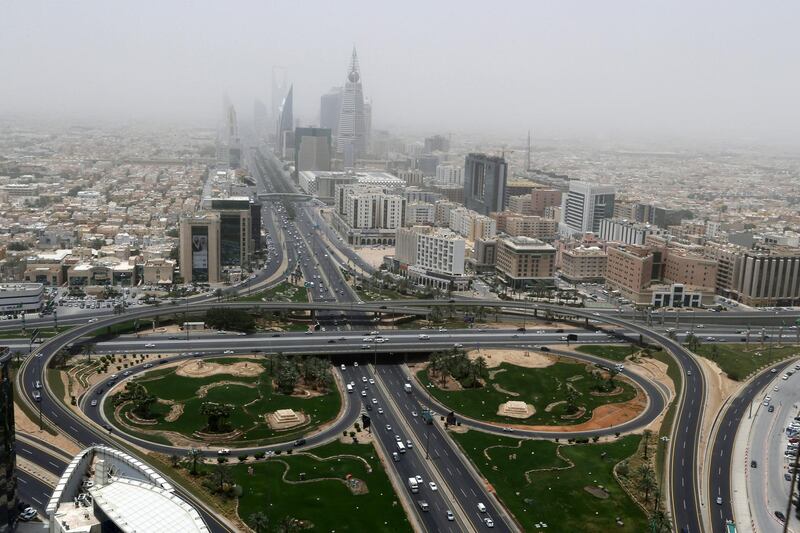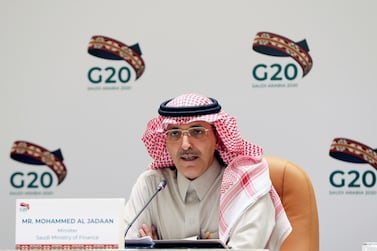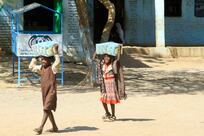Saudi Arabia has taken a set of unprecedented economic, social and healthcare measures to protect businesses and residents from the impact of the Covid-19 pandemic. The Arab world's largest economy, which has a population of about 30 million people, shut its borders, imposed strict curfews and rolled out economic stimulus packages worth billions of riyals to contain the spread of the virus.
In 2012, the kingdom battled an outbreak of Middle East Respiratory Syndrome (Mers). Below are some of the key steps the kingdom has taken to stave off the impact of the Covid-19 pandemic so far, which has dented growth worldwide and tipped the global economy into a recession.
May 11: Saudi Arabia says it will reduce government spending, suspend cost of living allowance paid to state employees and increase value-added tax three-fold to 15 per cent from the current five per cent starting on July 2020, according to finance minister Mohammed Jadaan.The measures will save the kingdom 100 billion riyals (Dh98bn).
May 4: The Saudi Arabian Monetary Authority, the country's central bank, reaffirms commitment to its exchange rate policy of pegging the riyal to the US dollar.
May 3: Saudi Arabia said it will isolate the industrial area of the eastern city of Dammam until further notice to curb spread of the novel coronavirus, though freight shipments will continue
May 3: Mr Jadaan says the government will take "painful but necessary" measures for stability of public finances and emphasised that liquidity in the country's banking system was "very high".
May 2: Saudi Arabia's Social Development Bank earmarks 9 billion riyals (Dh8.8bn) for micro-enterprises and self-employed businesses.
April 26: The kingdom's government allows businesses to reopen and eases bans on movement to lessen economic toll of the coronavirus containment measures.
April 26: China will provide Saudi Arabia with nine million Covid-19 test kits under a $264 million (Dh969m) deal. The contract also provides the kingdom with 500 technicians from China to perform the tests and train local staff.
April 23: Mr Jadaan says Saudi Arabia has the financial ability to deal with the impact of the coronavirus and the kingdom plans to reduce government spending and increase borrowing. It may borrow an additional 100 billion riyals (Dh98bn), on top of the previously announced 120bn riyals, bringing the total debt issuance to 220bn riyals this year. The government will also withdraw 110bn to 120bn riyals from its reserves to bridge a deficit caused by a plunge in oil prices and lower oil production.
April 17: Saudi Arabia, the current chair of the G20, pledges $500 million (Dh1.83bn) to support global efforts to combat the Covid-19 pandemic.
April 15: King Salman bin Abdulaziz Al Saud approves a package of additional measures to mitigate the economic impact of coronavirus. Government sets aside 50bn riyals (Dh48.96bn) to speed up payments to the private sector and provides a 30 per cent discount on electricity bills for businesses in commercial, industrial and agricultural sectors for two months with possible extensions. Allows subscribers in the industrial and commercial sectors to pay just half of their electricity bills during the second quarter.
April 10: Opec+ alliance, led by Saudi Arabia and Russia, agrees to historic production cuts to balance the market. The group agreed to cut 9.7 million bpd in May and June, with tapered cuts to hold until 2022. Other Gulf members would cut another 2m bpd.
April 3: Government to cover 60 per cent of the salaries of private-sector workers in industries hit by the coronavirus pandemic.
April 2: Saudi Arabia tightens its coronavirus curfew to 24 hours a day in the holy cities of Makkah and Madinah.
March 30: King Salman says patients diagnosed with coronavirus in the kingdom would get free healthcare.
March 29: Country extends the suspension of all international and domestic passenger flights indefinitely. Private and public sector employees are barred from going to their workplaces.
March 20: Unveils a comprehensive economic stimulus package worth 70bn riyals, which consists of exemptions and postponement of some government dues to provide liquidity to the private sector to help them continue operations amid the Covid-19 outbreak.
March 18: Suspends work in the private sector except for health, food and other vital services. Government jobs – except for those in health, security and the military – are already on hold or are being done remotely.
March 15: SAMA introduces the 50 billion riyal (Dh48.9bn) economic stimulus package to shore up its private sector. The Private Sector Financing Support Programme is aimed at extending finance to small and medium enterprises (SMEs) to stimulate growth and preserve jobs.
March 15: Municipalities in Saudi Arabia's major cities say malls, restaurants, coffee shops and public parks will close after the country recorded its first case on March 1.







